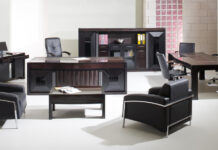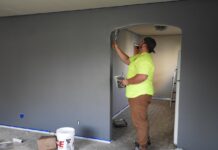You’ve finally done it! You’re stepping out on your own, doing your own thing, and heading for success. No more 9 to 5 serfdom in the anonymous cubicle farms of corporation land. You’re going to make a difference, work with great clients, and lower your stress. What an adventure!
But first, you have to have a home base. You’re just starting out, so there’s no need to increase your overhead by renting an expensive office. In fact, all you need is the right space in your own home and the right pieces of equipment, and no one will know the difference.
So grab your favorite water pitcher and let’s get started…
What Kind of Space Do You Need?
No matter where you live, be it a cramped studio apartment or a 5,000 square foot home, there’s one thing you’re going to have to fight if you’re going to be a home-based entrepreneur. It can be summed up in one word: boundaries.
That’s right. You need a space that says “I mean business.” If you’re in your office, then your kids can’t come in to play or ask questions. Your wife can’t walk in and ask you to retrieve the cat from the roof. Your friends and neighbors can’t just drop by to chit chat. In this space, the same rules apply as in a “real” office.
So what kind of space is best? It can’t be any space. For example, it would be really hard to enforce boundaries if your space is the kitchen table or the master bedroom.
If at all possible, you need a room with a door. There are even better options. An annex building or a loft conversion can be the perfect solution, since it is isolated from the rest of the home; click here for ideas. You need enough space for a desk and a few guest chairs in case you get visitors. You also need room for a filing cabinet, a bookcase, and a phone. In fact, make sure that you have adequate electric outlets and phone jacks in this room. With computers, faxes, phones, and Internet connectivity, you’ll end up using quite a few outlets.
Flooring is an important consideration for home-based business owners. You should invest in screed flooring throughout your home that is slip resistant and will look attractive in your home office as well. London Flow Screed is one of many companies that can implement the flooring update. If you want a more refined look, traditional wood floors would be a good idea but they are more susceptible to getting scuffed and damaged by spills.
One more thing to consider — when you’re sitting in a room full of office furniture and equipment, it can warm up pretty fast, so make sure this room has good ventilation and even a ceiling fan. Nobody likes to work in a miserable environment.
Planning Your Office Layout
Before you buy anything — furniture, computers, faxes, whatever — take the time to survey your home office and plan a layout. Because every space is different, there’s no point in providing specific pointers, but there are some general pointers that will keep you sane.
1. Think frugal.
Do you really need a brand new desk, or is the old one you’re storing in the garage good enough if you give it a good cleaning? Can you use your old laptop for a while before spending big bucks on a better system? Make that new purchase a reward for landing a client.
2. Think power sources.
You might want your desk up against the window, but if there are no electric plugs nearby, you might have to consider moving the desk or getting extension cords (and taping them down for safety).
3. Think privacy.
It’s a bad idea to sit in your office with your back to the door. What if you’re working on a sensitive document for a nervous client and you don’t realize that a friend has been standing at the door looking at your work? Invest in affordable blinds that will prevent curious neighbors from peering in during your workday.
4. Think storage.
No matter what kind of business you’re in, you’re going to generate records, both electronic and paper-based. You’re going to need a closet to put this stuff into. If the room you’ve selected doesn’t have a closet, then relegate a corner for filing cabinets, banker’s boxes, and other “storage” type material. Should your amount of belongings in your home office become unmanageable, self storage is an option and there are many companies that will store your files in a safe offsite location.
Having good supplies is key for a productive home office. Invest in high quality pens, a notepad, planner, folders to organize documents, and the filing cabinet. Mechanical pencils are great when filling out documents to keep them looking clean and avoid the hassle of starting over when making mistakes. Check out a mechanical pencil buying guide here to find the best options for your day-to-day writing tasks.
If you’re like me, working really means sitting — a chair isn’t something you want to skimp on. You need one that is fully adjustable (height and arms) and has lumbar support. If you get a chair with casters, make sure you buy a floor mat — it saves wear and tear on the floor or carpeting of your home office.
Chairs come in a variety of makes and models, with prices ranging from $50.00 to $450.00, with a fully adjustable type around $200.00.
What’s a chair without a good desk? These days, desks come in all shapes, sizes, configurations, and materials. Make sure that whatever you get fits the space, fits your image, is the right height for you and fits your budget.
Expect to pay anywhere from $250.00 to $600.00 for a new desk. If you are budget-minded, look for used business furniture or consignment stores in your area. You will probably find better quality (i.e., solid wood versus particle board), and better prices. Other places to look for bargains are auctions held by companies going out of business.
Buying the Right Computer to Make You Money
Thankfully, you can buy a fairly sophisticated desktop computer at places like Fry’s or Best Buy for under $750, including a low-end flat-screen monitor.
Remember that you’ll be using your computer more often than you think. So take your budget into account when you make your purchase. This means:
- Get the best quality monitor you can afford.
- Invest in as much RAM and processor speed as you can afford so you can do your work faster.
- Consider an ergonomic keyboard and mouse arrangement.
If you travel a lot, consider a laptop instead of a desktop. They cost more, but you’ll be more productive. A final note: if you already have a good home PC, see if you can upgrade its memory or hard drive to meet your needs. A few hundred dollars there might save you a lot more than money, as you won’t have to transfer files (which takes up time).
Investing in Faster Internet Access
I’ll be brief here, as you should know about Internet Service Providers (ISPs). Get as much speed as you can afford, and by that I mean broadband service (cable modem or DSL).
Avoid dial-up, it’s too slow. All the money you save every month will evaporate when it takes you three hours to send that important e-mail attachment to the client who needs the data for an emergency meeting starting now. Bye-bye client.
Networking Your Home Office
More and more home-based operators are opting for wireless networking in their home offices. Why? Because it’s cheaper and easier to install than all those networking cables. If you have a wireless network, you can take your laptop out to the back patio on those really beautiful days and still be productive. You can also do things like set up your printer on a wireless network so that other family members have access to the printer (saves you money when you don’t have to buy a second printer).
Deciding on a Printer, Fax, and Scanner
You’re not going to want to run down to Kinko’s every time you need to fax something or make copies. You can save a lot of money (and space!) by purchasing an all-in-one system that prints, faxes, copies, and scans. Hewlett Packard, Lexmark, Brother, and other manufacturers offer all-in-one models from $90.00 to $600.00 or more.
Getting a Business Line or Cell Phone
At minimum, you will need a cell phone, because your clients will want to get a hold of you. Eventually, you’ll probably want a separate line in your home office, one that isn’t going to be answered by a family member or friend.
Regardless of your arrangement, always answer your business line courteously and professionally. You don’t want to lose a sale because you sound frustrated or out of sorts.
















































